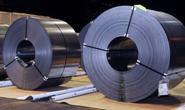Government/Policy

November 8, 2016
U.S. DOC Initiates Circumvention Probe on Cold Rolled
Written by John Packard
On Monday the U.S. Department of Commerce initiated an investigation against China for trying to circumvent antidumping and countervailing duty orders. The DOC was responding to petitions filed by the domestic steel industry on cold rolled. The DOC also initiated an investigation on CORE (corrosion resistant) which SMU will cover in a separate article.
There are some interesting comments made in the DOC response that SMU readers will need to understand as they go about their normal buying of foreign steel products.
Cold Rolled Initiation
The petitions filed by ArcelorMittal USA, Nucor, US Steel, AK Steel, Steel Dynamics and California Steel in late September 2016 allege that hot rolled substrate (HR) produced in China and then sent to Vietnam for conversion to cold rolled are in effect an effort by China to circumvent the AD/CVD orders here in the United States. The U.S. Department of Commerce has agreed that an investigation is warranted but at the same time they did not issue a preliminary determination as the mills had requested.
The investigation will only be on cold rolled steel exported to the United States from Vietnam using HRC substrate from China.
The DOC initiated the anti-circumvention inquiry based on the following criteria:
1) Merchandise imported into the U.S. is of the same class or kind as merchandise produced in a foreign country that is subject to an AD/CVD order or filing.
2) Before importation into the U.S. such imported material is completed or assembled in another foreign country from material which is subject to the order [AD/CVD] produced by a foreign country subject to the order.
3) The process of assembly or completion mentioned in #2 is minor or insignificant.
4) The value of the merchandise produced in the foreign country to which the AD or CVD order applies [i.e. China] is a significant portion of the total value of the merchandise exported to the U.S.
5) The administering authority determines that action is appropriate to prevent evasion of such order or ruling.
What appears to be the most damning evidence provided by the domestic steel mills is the number of tons coming from Vietnam tripled the previous two years combined shortly after the CVD orders were found against China in December 2015. In the calendar year 2014 Vietnam shipped zero tons of cold rolled to the United States.
The domestic mills also pointed a finger at Minmetals, a U.S. trading company, which was shipping hot rolled steel from China to Vietnam to convert to cold rolled steel for export to the United States “with the purpose of evading the Orders.”
In the past conversion of HR substrate to CRS has been considered “significant transformation” in the DOC initiation document they are ignoring that definition and appear to be concentrating on the value of the underlying substrate as being a large percentage of the value of the finished product. The DOC bought the domestic mills’ claim that the level of investment for re-rolling facilities “is minimal when compared with the level of investment for basic steel making facilities.”
Domestic buyers here in the U.S. may be interested in the following contention made by the domestic steel mills that the hot rolled substrate from China represents 80 to 90 percent of the value of the finished cold rolled product.
The initiation order includes information regarding the issuance of anti-circumvention inquiries from the DOC to the Vietnam CRS producers and exporters regarding the origin of the hot rolled substrate used to produce their cold rolled coils. A failure to respond may result in the application of partial or total facts available [in other words they will be found guilty of circumvention].
If a Preliminary Affirmative Determination is Found
“…we will then instruct U.S. Customs and Boarder Protection to suspend liquidation and require a cash deposit of estimated antidumping and countervailing duties, at the applicable rate, for each unliquidated entry of the merchandise at issue, entered or withdrawn from warehouse for consumption on or after the date of initiation of the inquiry.”
DOC advised the final determination could take up to 300 days from the date of the publication of their initiation document in the Federal Register.
Source: US Department of Commerce Initiation Order







